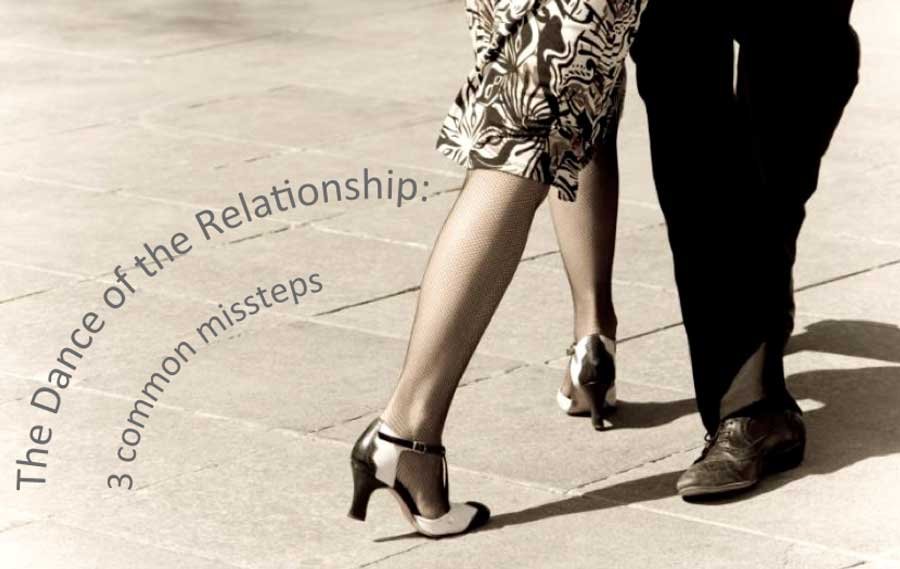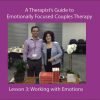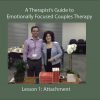A relationship is like a dance. One partner puts their feet in response to where the other puts theirs. And the tune we dance to is almost entirely made up of emotions...
When one partner says: "Why do we never go on dates anymore?" they are communicating an emotion. Depending on their tone of voice, their facial expression, their body posture, and the emotion they feel when they ask the question, their other half is either going to dance with them by saying something like "oh! I guess we haven't been going out much. I am really sorry if you have been feeling neglected", or they are going to get out of step, by saying something like "well you haven't exactly been easy to be around lately!". In this way, emotions get passed back and forth between partners, and they either lead to partners being in sync with one another, or painfully out of tune.
Emotion Rules the Day:
In a relationship, we don't respond to the content of what the other person says. We respond to the emotion.
So if our partner's request to go on more dates is seen as a complaint that we are not being a good husband or wife rather than as a tender longing to be close to us, we are going to respond out of anger or anxiety, and not out of love and compassion.
Three Common Missteps in the Relationship Dance:
If we pick up on a negative emotion in our partner's message that implies something bad about us or about our relationship, then our next dance move is likely going to come from a place of self-protection.
There are three main missteps that can lead us to become out of tune and get us stuck in a negative dance:
1. The Dance of Anxiety:
If the request to go on a date makes us feel anxious or like we are in trouble, then our freedom to bask in the glory of love is going to be short-circuited, and we are likely going to say or do whatever we need to in order for the danger to pass. This might lead us to appease our partner, or agree to do something, not out of love, but out of fear and duty. And this then gets the dance off on the wrong foot. Now our partner may notice the lack of genuineness in our response, or might feel like we are just going through the motions, or saying whatever they want to hear. It is hard to fake the kind of dance move that comes straight from the heart, and it is easy to tell a fake substitute for the real deal. In this way dancing out of fear and nervous apprehension about being in trouble tends to lead to another negative counter-move on the part of our significant other who will now feel frustrated, anxious, or kept at bay. And this will only perpetuate our sense that we are in trouble with our partner, and that we need to get our act together before it is too late.
2. The Dance of Wounded Pride:
If the request to go on a date makes us feel that our worth and value as a partner is assaulted, then instead of anxiety, we might get in touch with a sense of feeling rejected or unappreciated. In some couples this tint of shame or not being good enough will fuel some of our most vicious defenses. If we end up feeling "small" or discarded, and the sense of shame and rejection is too great, we might become contemptuous and seek to undercut the other person's worth as a person. This kind of dance move is one of the most destructive, since it makes the other person our enemy, and make us say or do things that are directly contrary to the communication of love. Couples researcher John Gottman has done research to show that "contempt", which is the feeling we have when we want to spit something out because of its toxicity, is the most destructive emotion in a relationship, and most closely related to divorce and break-up.
3. The Dance of Depression:
Finally, if the request to go on a date makes us feel anxious or inadequate, but in a way that gets us more in touch with our own self-doubts and our own depressed view of ourselves as a failure, our next step in the dance might be to withdraw inward. In this kind of situation we become like the turtle who sticks its head back into its protective shell. In a relationship this might look like one person sharing less of their thoughts and feelings, and dealing with issues and emotions on their own. This kind of dance move oftentimes gets interpreted by our partner as a sign that we have checked out of the relationship, or that we don't have any passion for them anymore. Needless to say when this emotion is what our partner perceives, their next dance move will not a be a positive one. We might therefore quickly find ourselves in a vicious cycle where our withdrawing, which is intended to protect ourselves from criticism, only leads to more anger and criticism and an increased need for self-protection.
How to Stop Stepping on Each Other's Feet:
Once a negative emotional dance has been set in motion, it is often difficult to get out of. Each partner is now too preoccupied by how they feel to step back and see the larger pattern of the negative dance they both are stuck in.
In emotionally-focused couples therapy, what we try to do is to help couples see how their negative emotions get generated due to the significance they attribute to their partner's actions and omissions. We also help partners see how their own emotional responses in turn impact and generate emotions in the other person. Once both partners can begin to see that they are both caught in a musical performance that neither of them want or intend to keep playing, then they can begin to step outside of their automatic and habitual responses, and start to play a different musical piece.
You Might Need a Little Help...
Since, as the saying goes, "it takes two to tango", this kind of change in the relationship dance must involve a team effort. Both partners must realize that it is not the other who is the enemy, but the music of their dance which they both contribute to. This kind of self-reflection can often be difficult to achieve without the help of a therapist who can stand outside the dance and act as a dance instructor.
In emotionally-focused couples therapy, couples learn how to place their feet in such a way that they can dance to a new tune and begin to play the kind of music that brings both of them close and makes both of them feel valued and safe.
Want to Read More?

In this article, I will teach you the one thing every couple should know about emotions in order to make their relationship work.


























